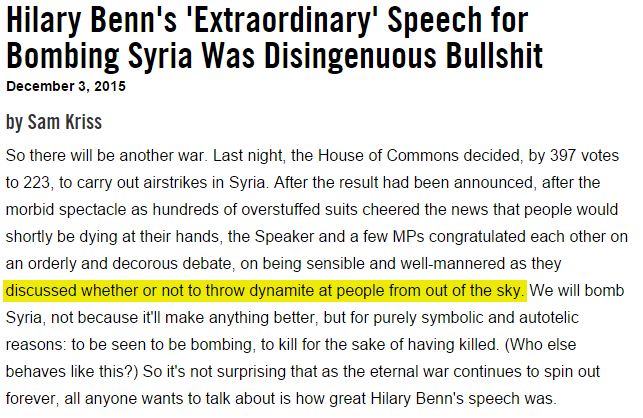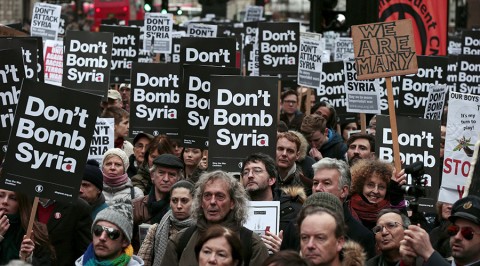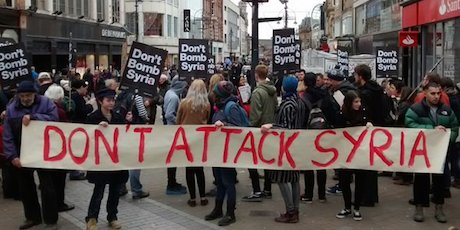Last week, on Wednesday night (December 2), after a long and heated debate, the House of Commons of the UK voted in favor of extending airstrikes against ISIS in Syria. I am not British but I followed it with great interest because it does not matter where you are from: I believe in internationalism, cooperation, solidarity, universal human rights and all those simple things. This debate could very well have been happening in other European countries, to different degrees, as it happened in Germany the very next day, in Sweden last month or as it will probably happen in Spain soon.
Some of the speeches were very passionate and, I must say, hair-rising; especially Hilary Benn’s address to his own Labour Party, explaining why targeting ISIS, as part of a bigger plan, is a good thing. There are those who will complain about the use of the word “fascists” to describe ISIS because it is “an emotionally charged word used to inflame people’s memory and make easier the call for war”. But the word “fascism” has evolved drastically and today it has countless definitions, many as mere pejoratives, that range from simple racism to anti-communism. Already in 1944 George Orwell wrote:
the word ‘Fascism’ is almost entirely meaningless. […] By ‘Fascism’ they mean, roughly speaking, something cruel, unscrupulous, arrogant, obscurantist, anti-liberal and anti-working-class. […] almost any English person would accept ‘bully’ as a synonym for ‘Fascist’.
I dare say that ISIS ticks all those boxes and I wonder how many people would claim that the word “bully” does not fit ISIS. Robert Paxton, who lived through, experienced and studied fascism first-hand, wrote in 2004 that fascism is:
a form of political behavior marked by obsessive preoccupation with community decline, humiliation, or victimhood and by compensatory cults of unity, energy, and purity, in which a mass-based party of committed nationalist militants, working in uneasy but effective collaboration with traditional elites, abandons democratic liberties and pursues with redemptive violence and without ethical or legal restraints goals of internal cleansing and external expansion.
Throw Islam in the mix and you will not find a better definition of ISIS’ actions and intentions.
I have seen on social media since Wednesday many comments and memes condemning the decision of the House of Commons. There are many arguments against the motion (David Paxton brilliantly listed and rebutted the main ones just as the debate was getting started) and I have read much about nearly all of them, but none of the posts I see today written or shared by friends, colleagues and acquaintances reach those levels of sophistication. Most of them are reduced to inaccurate mottos, incorrect reporting and dull graphics. And I am convinced that most of these average citizens would not oppose the motion so vehemently if not for the dishonesty and misinformation that so easily spreads through social media and unethical journalism.
First of all, and most important, the slogan of the protest on the 28th of November: “Don’t Bomb Syria”.
If someone completely unaware of the circumstances bumped into these demonstrations it would be fair for them to think that the UK government was about to declare war against Syria; that it was studying the possibility of dropping bombs indiscriminately on the general area of the nation of Syria, or planning a wide-scale offense directly against the totality of the Syrian population. What else could “Don’t Bomb Syria” and “Don’t Attack Syria” mean? Well, if we take a moment to read the motion that was being debated on Wednesday, we find that the proposition was fundamentally (emphasis mine):
[…] taking military action, specifically airstrikes, exclusively against ISIL in Syria […]
Now, I accept that some people can be against military action against ISIS but, in that case, should not they be daring enough to march under the slogans “Don’t Bomb ISIS” and “Don’t Attack ISIS”? It is clear to me that the intentions of the UK government are not to “bomb” or “attack” Syria, but to target ISIS’ headquarters, bases and resources that happen to be in Syria. As we know, the UK, in coalition with France and the US, has been targeting ISIS in Iraq for almost 15 months, and the border between these two countries is so unsubstantial that it makes no sense to stop targeting them after they cross some fictitious line.
This is the obfuscation caused by vague and imprecise terms and it happens not only in demonstrations and protests, but also in a new variety of unprofessional journalism and meme sharing; and many people will only get and share their information from these sources. If someone uninformed reads the headline “UK bombing Syria” I would understand their disapproval; if they saw a protest under the banner “Don’t Bomb Syria” I would understand their support of it. But that headline and that banner are utterly misleading. First, what does “Syria” mean? Which concept of “Syria” is going to be bombed or attacked? The Syrian people? The Syrian cabinet? The government, the parliament building? If that was the case I would be against the motion too. Who would not oppose their government’s attack on a whole other country that has done nothing to them? But obviously none of those concepts were part of the debate on Wednesday. Yes, some of the bombs will land on Syrian territory but that is not the same as bombing Syria as a country. Britain is not at war with Syria.
All of this reminded me of the London protests on February 24th 2007 opposing military action against Iran. I happened to be visiting London those days with some friends. We had no knowledge of the demonstrations and only found out about them when we saw abandoned signs on the floor with the words “Don’t Attack Iran”. We had no idea what specific military actions were being discussed, against who, why, or with what purpose; nevertheless there is a photograph of me holding one of those signs with a gesture of disapproval, supposedly directed to the UK and US governments. Because, naturally, we were all against it. Note that I am not opposing nor supporting that specific military action now: but, on that day, I decided I was against it, based on absolutely nothing. I wonder how many people joined the “Don’t Bomb Syria” demonstrations with the same level of awareness.
Likewise, I believe that most people, myself included, when reading about “bombings”, visualize something like this:
B-52s carpet-bombing Vietnam; clouds of bombs falling on Dresden; the Blitz; indiscriminate targeting of a whole city. Hiroshima and Nagasaki. That is what “bombing” means, right? Who would support that? The truth is today’s technology in precision strikes is nothing like that. We no longer open the airplane hatch and “drop bombs”. But, judging from what some MPs and journalists write, that is exactly the image they have in their heads when they talk about “bombing”:

 “Bombs falling”, “throw dynamite at people from out of the sky”: the language used here reflects a deep ignorance about the kind of military actions proposed in the motion and a biased thinking based on incorrect preconceptions. Again, if someone opposed “throwing dynamite at people from out of the sky” I would understand their rejection, but that is not what was being discussed. As Middle East analyst Tim Eaton explains on Newsbeat:
“Bombs falling”, “throw dynamite at people from out of the sky”: the language used here reflects a deep ignorance about the kind of military actions proposed in the motion and a biased thinking based on incorrect preconceptions. Again, if someone opposed “throwing dynamite at people from out of the sky” I would understand their rejection, but that is not what was being discussed. As Middle East analyst Tim Eaton explains on Newsbeat:
While [RAF] weapons are accurate they rely upon strong intelligence. So far we’ve been reluctant to hit targets unless we’re very sure about what they are. We don’t have a lot of intelligence data to act upon so the truth is we won’t be dropping many bombs.
Indeed, since the vote on Wednesday the UK has launched only two attacks so far against ISIS in Syria, targeting exclusively the Omar oilfield with no civilian casualties reported:
The Omar oilfield is one of the largest and most important to Daesh’s financial operations, and represents over 10% of their potential income from oil. Carefully selected elements of the oilfield infrastructure were targeted, ensuring the strikes will have a significant impact on Daesh’s ability to extract the oil to fund their terrorism.
Thus, we have quickly moved from “Don’t Bomb Syria” to “Don’t Extend Military Precise Actions Already Taking Place in Iraq to a Sort of No Man’s Land in Syria, Targeting Exclusively ISIS’ Sources of Income and Control Only When Based on Strong Enough Intelligence”. I really would like to see someone marching under that banner.
A final example of the damage caused by dishonest and incorrect information is a meme basically claiming “Cameron strongly opposed Russia bombing Syria but he is happy to bomb Syria now when it benefits him”. It sounds certainly hypocritical of Cameron to change his mind so easily. The problem is neither Russia was bombing “Syria” before nor the UK is bombing “Syria” now. The targets of these military operations are very different: Russia’s objective was mainly the opposition to Assad and the UK is focusing now on ISIS. But conflating every bombing as the same kind of attack and all Syrian groups as the same “Syria” entity causes these unscrupulous dissemination of false information. And it spreads like wildfire.
Of course, all these misconceptions are not caused only by incorrect information: behind this meme-sharing, self-blaming masochism we always find an inherent mistrust of the West, its ruling parties and its leaders. People would still support my more accurate second banner because they would still doubt that those are the government’s true intentions. One of the posts shared by a friend basically explained that ISIS does not exist and that “Syria has something they want and they needed a excuse [sic] to get in there now they got one”. I know whoever wrote this is just part of an uneducated minority, but they exist within a spectrum of people, many of them very intelligent and with extensive education, with more or less sophisticated arguments ranging from conspiracy theories to plausible but inconsequential ideas, who simply distrust anything their governments do. It is very easy to see that it is impossible to satisfy them and that, as many have said, the game is rigged. If there is no intervention, “they are just letting them kill each other”. If there is military action, “they want to steal their oil”. If the military action targets only ISIS, “they are bombing the shit out of Syria”. And so on.
I am all for honest criticism, disagreement and debate, for truth and fairness. But when the critics resort to tactics like fallacious nonsense, outright lies and inaccuracies to win ignorant supporters in the argument, I see the biggest problem in this global crisis: the impossibility of having a frank conversation about it. But we know it is much easier to create a lie than to disprove it; it is much easier to start a fire than to put it out.



